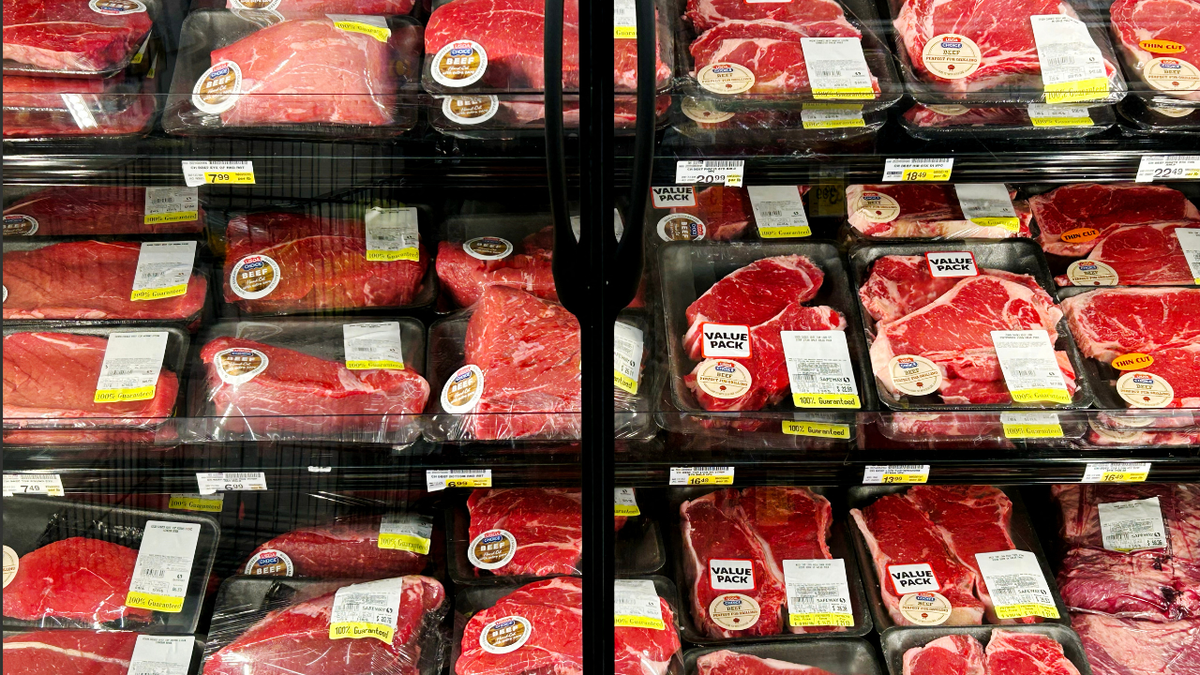INTERNACIONAL
Trump’s beef import plan ignores key issue squeezing American cattle ranchers

NEWYou can now listen to Fox News articles!
While President Donald Trump’s proposal to import more beef from Argentina is billed by the administration as a way to bring down prices for American consumers, critics say it misses the real issue driving costs at the grocery store: corporate concentration in the U.S. meatpacking industry.
Four corporations — Tyson, JBS, Cargill and National Beef — anchor the U.S. beef supply chain, with pricing power that reaches from pasture to plate. As a result, the gap between what producers are paid for cattle and what consumers spend on beef has remained wide, a reflection, economists say, of how market power is distributed along the supply chain.
Fox News Digital reached out to all four companies for comment but did not receive a response as of publication.
TRUMP ADMIN EYES ARGENTINE BEEF IMPORTS AS DOMESTIC PRICES SOAR TO RECORD HIGHS
Some critics argue the real problem isn’t about supply, it’s the corporate giants controlling America’s meat industry. (Melina Mara/The Washington Post/Getty Images)
The frustration extends beyond farm country – Rep. Thomas Massie, R-Ky., says the dominance of multinational meatpackers is hurting both producers and consumers.
«Four corporations control 85% of the meat sold in the United States. One of these corporations is Chinese-owned and one is Brazilian-owned. American farmers are being squeezed and American consumers are being gouged,» Massie told Fox News Digital.
Massie, who raises cattle on his Kentucky ranch, warned that expanding beef imports from Argentina would only worsen those structural problems.
«Flooding the market with Argentinian beef is not the answer to these problems. An America First solution to rising beef prices is to pass my PRIME Act, which would empower American farmers to sell directly to consumers without interference from global corporate middlemen,» Massie said.
Under current federal law, beef processed at small, state-inspected facilities can’t be sold across state lines, even if it meets the same health standards as federally inspected meat. Massie’s PRIME Act would remove that barrier, a change supporters say would let local ranchers reach more consumers and compete with the big packers.
GOP LAWMAKERS WARN TRUMP’S ARGENTINA BEEF PROPOSAL COULD RATTLE US RANCHERS

Agriculture Secretary Brooke Rollins recently unveiled a plan aimed at strengthening the U.S. cattle industry. (Ty Wright/Bloomberg/Getty Images)
Economists agree the beef market is highly consolidated, but say the forces shaping prices go well beyond any one trade deal.
Glynn Tonsor, a professor of agricultural economics at Kansas State University, told Fox News Digital that strong consumer demand continues to drive beef prices higher, regardless of supply fluctuations.
«There’s nothing that forces me or you or anybody else when we go into the grocery store to pay more for beef. People are choosing to,» he said. «The consumer desire for beef is strong and, regardless of the supply-side situation, that has the effect of pulling prices up.»
He also noted that the large-scale structure of the U.S. meatpacking industry, often criticized by ranchers and lawmakers, has economic benefits for consumers.
«I would argue that those economies of scale benefit consumers,» Tonsor said. «The ability to operate at a cheaper cost per head and, ultimately, per pound produced gives us the ability to offer beef and every other item we’re talking about at a cheaper price. Anything we do that loses those economies of scale actually hurts consumers in the form of higher prices.»
FROM CATTLE TO CRUDE: HOW TRUMP’S TARIFFS ARE RATTLING THE LONE STAR STATE

The White House has previously said that importing beef will help address the rising food costs in the U.S. (Jim Watson/AFP/Getty Images)
Derrell Peel, a professor of agricultural economics at Oklahoma State University, said that even if U.S. imports from Argentina increase, the impact on overall prices would be negligible.
«Most of what we import is lean, processed beef trimmings used for ground beef,» said Peel, who specializes in livestock marketing. «We’re not talking about the kind of beef that affects steak prices. Even if we doubled imports, it would be such a small share of the total supply that we wouldn’t detect any real impact.»
Peel added that there’s no quick way to ease pressure on cattle prices, since it takes roughly two years to bring animals to market and several years to rebuild herds.
«The fact of the matter is there’s really nothing anybody can do to change this very quickly,» he said. «We’re in a tight supply situation that took several years to develop, and it’ll take several years to get out of it.»
BEEF PRICES HIT RECORD HIGHS AS NATIONWIDE CATTLE INVENTORY DROPS TO LOWEST LEVEL IN 70 YEARS

Economists say there’s no quick way to ease pressure on cattle prices or beef. (Ricky Carioti/The Washington Post/Getty Images)
CLICK HERE TO GET THE FOX NEWS APP
Meanwhile, the White House defended the plan, saying it’s aimed at balancing relief for consumers with long-term support for U.S. cattle producers.
«The president loves our ranchers, and he also loves American consumers, and he wants to do right by both,» White House press secretary Karoline Leavitt said on Wednesday.
Leavitt said Trump’s immediate goal is to lower beef prices by increasing supply through additional imports, while a separate, long-term plan will focus on strengthening the domestic cattle industry.
She pointed to a three-part plan announced by Agriculture Secretary Brooke Rollins, which includes expanding grazing access, easing regulations for new ranchers, cutting inspection costs and improving «Product of USA» labeling to ensure consumers know when they’re buying American-made beef.
trade,texas,finance global economy,south america,white house,republicans elections
INTERNACIONAL
El ataque a Irán afectó también los viajes en Medio Oriente: caos en vuelos y aeropuertos

El ataque de Estados Unidos e Israel a Irán en la madrugada del sábado cambió sorpresivamente los planes de vuelos en todo Oriente Medio por el cierre del espacio aéreo en la región y las complicaciones se extendían este fin de semana por los ataques contra algunos aeropuertos y la suspensión de las operaciones en estaciones clave que conectan Europa, África y Occidente con Asia.
Cientos de miles de viajeros quedaron varados o fueron desviados a otros aeropuertos luego que Israel, Qatar, Siria, Irán, Irak, Kuwait y Bahréin cerraron sus espacios aéreos. Tampoco hubo actividad de vuelos sobre Emiratos Árabes Unidos, según el sitio web de rastreo FlightRadar24, después que el gobierno allí anunciara un “cierre temporal y parcial” de su espacio aéreo.
En ese marco se produjeron el cierre de aeropuertos clave de conexión en Dubái, Abu Dabi y Doha, y a la cancelación de más de 1.800 vuelos por parte de las principales aerolíneas de Oriente Medio. Las tres aerolíneas más importantes que operan en esos aeropuertos —Emirates, Qatar Airways y Etihad— suelen tener alrededor de 90.000 pasajeros por día transitando por esos centros y aún más viajeros con destino a lugares en Oriente Medio, según la firma de análisis de aviación Cirium.
En medio hubo un ataque de represalia iraní que impactó en el Aeropuerto Internacional de Dubái, el más grande de Emiratos Árabes Unidos y uno de los más transitados del mundo, donde al menos un hombre de nacionalidad asiática murió y otras tres personas resultaron heridas.
Emirates condenó el “ataque flagrante que involucró misiles balísticos iraníes”. También se reportaron ataques en otros aeropuertos comerciales de la región, incluido el Aeropuerto Internacional de Kuwait.
Henry Harteveldt, un analista de la industria aérea y presidente de Atmosphere Research Group, alertó que los pasajeros “deberían prepararse para retrasos o cancelaciones durante los próximos días a medida que estos ataques evolucionen y, con suerte, terminen”.
Las aerolíneas que están cruzando Oriente Medio tendrán que desviar los vuelos alrededor del conflicto, con muchos vuelos dirigidos hacia el sur sobre Arabia Saudí. Eso añadirá horas a esos viajes y consumirá combustible adicional, sumándose a los costos que las aerolíneas tendrán que absorber. Por lo tanto, los precios de los boletos podrían comenzar a aumentar rápidamente si el conflicto se prolonga.
Los vuelos adicionales también ejercerán presión sobre los controladores de tráfico aéreo en Arabia Saudí, que podrían tener que ralentizar el tráfico a fin de asegurarse de manejarlo de manera segura. Y los países que cerraron su espacio aéreo dejarán de percibir las tarifas de sobrevuelo que las aerolíneas pagan por cruzar por encima.
Por ahora no está claro cuánto tiempo durará la interrupción de las operaciones de vuelo. A modo de comparación, el ataque israelí y estadounidense a Irán en junio de 2025 duró 12 días.
En ese contexto, algunas aerolíneas estaban emitiendo exenciones para los viajeros afectados, lo que significa que los pasajeros pueden reprogramar sus planes de vuelo sin pagar cargos adicionales ni tarifas más altas.
Al menos 145 aviones que se dirigían a ciudades como Tel Aviv y Dubái a primera hora del sábado fueron desviados a aeropuertos en ciudades como Atenas, Estambul o Roma, según FlightAware. Otros dieron la vuelta y regresaron al lugar desde donde despegaron.
Un avión pasó casi 15 horas en el aire después de salir de Filadelfia y llegar hasta España antes de dar la vuelta y regresar al lugar donde comenzó.
Numerosas aerolíneas cancelaron vuelos internacionales a Dubái durante el fin de semana, y la agencia de aviación civil de India designó gran parte de Oriente Medio —incluidos los cielos sobre Jordania, Arabia Saudí y Líbano— como una zona de alto riesgo de seguridad a todas las altitudes.
Air India canceló todos los vuelos a destinos de Oriente Medio. Turkish Airlines señaló que los vuelos a Líbano, Siria, Irak, Irán y Jordania se suspenderán hasta el lunes, y que los vuelos a Qatar, Kuwait, Bahréin, Emiratos Árabes Unidos y Omán se suspenderán hasta nuevo aviso.
Delta Airlines, con sede en Estados Unidos, y United Airlines suspendieron los vuelos a Tel Aviv al menos durante el fin de semana, y la aerolínea holandesa KLM ya había anunciado a principios de semana que suspenderá sus vuelos con origen y destino en Tel Aviv.
Aerolíneas como Lufthansa, Air France, Transavia y Pegasus han cancelado todos los vuelos a Líbano, y American Airlines suspendió los vuelos de Filadelfia a Doha.
La inglesa British Airways informó que sus vuelos a Tel Aviv y Bahréin se suspenderán hasta la próxima semana, y que los vuelos a Amán, Jordania, se cancelarán el sábado.
Con información de AP / SMB
INTERNACIONAL
Concerns rise over DHS shutdown in shadow of Iran strikes: ‘Now would be a good time’ to end it

NEWYou can now listen to Fox News articles!
The partial government shutdown has Department of Homeland Security employees missing their paychecks even as the U.S. has engaged Iran with airstrikes that have brought the nation to the brink of war.
Earlier Saturday, the U.S. and Israel commenced targeted Iranian positions including the palace of dictator Ayatollah Ali Hosseini Khamenei – who was later declared dead by Jerusalem officials. The strikes have prompted concerns of retaliation, possibly inside U.S. borders.
«I am in direct coordination with our federal intelligence and law enforcement partners as we continue to closely monitor and thwart any potential threats to the homeland,» DHS Secretary Kristi Noem said in a statement.
As Friday rolled into Saturday, Transportation Safety Administration officers began effectively working pro bono, with the agency calling them «true models of selflessness and sacrifice.»
«Right now, the men and women of TSA are showing up to work without a paycheck due to the reckless DHS shutdown — despite the fact that Democrat members of Congress are still getting paid,» the agency said in a statement, calling out Democrats’ «political theater making life harder for these officers and their families.»
Lawmakers took notice of the disparity on Saturday as eyes turned to the security of America’s homeland amid Iran’s pledge to strike back.
«Given developments in the Middle East and the ongoing threat posed by Iran and its terrorist proxies, Democrats in the house, and Senate must cease the politics and must immediately fund the Department of Homeland Security,» said Rep. Daniel Meuser, R-Pa.
The Blue Mountain congressman – whose district is home to the agency’s latest immigration center purchase in Shartlesville, which is simultaneously being lambasted by Pennsylvania Gov. Josh Shapiro – added that blocking DHS funding is «irresponsible and dangerous» amid the rising global tension.
«Democrats in Congress must join Republicans, act responsibly and stop blocking efforts to fund DHS,» said Meuser.
Meuser added that protecting American people is a fundamental federal responsibility and that the U.S. cannot afford national security-related delays.
DHS SHUTDOWN TRIGGERS TSA ‘EMERGENCY MEASURES’ AS LAWMAKER WARNS AIRPORTS COULD FEEL ECONOMIC PAIN
His Keystone compatriot Sen. David McCormick echoed that sentiment in a Saturday statement:
«Now would be a good time for Democrats to drop their opposition to DHS funding and pass the bill to support our homeland security,» McCormick said.
«Continuing to play political games with our national security given the unfolding situation in the Middle East is dangerous.»
While many Democrats voiced concern or opposition to the Trump administration’s strikes, McCormick’s counterpart, Sen. John Fetterman, ridiculed critics on X – retweeting an alert that Ayatollah Ali Hosseini Khamenei had been killed, writing: «Let’s see who grieves for that garbage.»
The top Democrat on the House Homeland Security Committee, however, did criticize the operation.
Rep. Bennie Thompson of Mississippi told NOTUS News on Saturday that Trump’s attack lacks «a clear strategy» while saying the U.S. is «vulnerable to ensuing terrorism attacks today because of Trump’s reckless, inflammatory actions.»
CLICK HERE TO GET THE FOX NEWS APP
Iranian worshippers hold up their hands as signs of unity with Iran’s Supreme Leader, Ayatollah Ali Khamenei, during an anti-Israeli rally to condemn Israel’s attacks on Iran, in downtown Tehran, Iran, on June 20, 2025. (Morteza Nikoubazl/NurPhoto via Getty Images)
«I am deeply concerned about the administration’s attention to possible threats and its ability to protect Americans,» he added.
Just prior to the strikes, the Senate and House Democratic leaders released a joint statement addressing the DHS shutdown’s current conditions.
«We have received the White House’s counteroffer and are reviewing it closely. Democrats remain committed to keep fighting for real reforms to rein in ICE and stop the violence,» said New York Sen. Charles Schumer and Rep. Hakeem Jeffries.
Fox News Digital reached out to DHS for additional comment.
war with iran,iran,donald trump,immigration,homeland security,republicans
INTERNACIONAL
Key military sites targeted inside Iran as part of coordinated US-Israeli strikes

NEWYou can now listen to Fox News articles!
In coordinated, sweeping U.S.–Israeli strikes on Iran in the predawn hours of Saturday, key military and nuclear-linked sites were targeted inside the country.
The strikes focused on what U.S. officials described as high-value Iranian targets, which included Iran Revolutionary Guard Corps (IRGC) command and control facilities, naval assets and underground sites believed to be associated with Iran’s nuclear program.
In addition, Iranian air defense weapons, missile and drone launch sites, and military airfields were also targeted, according to officials.
Israeli forces targeted sites linked to Iran’s Supreme Leader Ayatollah Ali Khamenei, a senior Israeli official confirmed to Fox News.
President Donald Trump confirmed Saturday afternoon that Khamenei had been killed in a strike. He is among more than 40 senior Iranian security and regime figures killed in the attack, a senior Israeli official told Fox News.
In coordinated, sweeping U.S.–Israeli strikes on Iran in the predawn hours of Saturday, key military and nuclear-linked sites were targeted inside the country. (Fatemeh Bahrami/Anadolu via Getty Images)
«Khamenei, one of the most evil people in History, is dead,» Trump wrote in a Truth Social post. «This is not only Justice for the people of Iran, but for all Great Americans, and those people from many Countries throughout the World, that have been killed or mutilated by Khamenei and his gang of bloodthirsty THUGS.»
He also claimed that the IRGC is seeking immunity from the U.S.
The leaders had all been meeting at a compound in Tehran on Saturday morning.

Iran’s Supreme Leader Ali Khamenei was killed in the strikes, President Donald Trump confirmed. (Iranian Leader Press Office/Anadolu via Getty Images)
FBI RAISES COUNTERTERROR TEAMS TO HIGH ALERT AMID IRAN TENSIONS
The strikes were moved up due to the «target of opportunity,» multiple sources told Fox News, which is why the strikes happened in the daytime in Iran, keeping the element of surprise. «There was a deliberate decision to accelerate the timeline,» one source said.
The campaign, which Trump described overnight from Mar-a-Lago as the beginning of «major combat operations» in the region, encompasses multi-geographic targets in an effort to overwhelm Iran’s defensive capabilities.

People watch as smoke rises on the skyline after an explosion in Tehran on Saturday. (AP Photo)
ISRAEL’S LARGEST EVER MILITARY FLYOVER HAMMERS IRANIAN MILITARY TARGETS
The strikes could also continue for multiple days.
CLICK HERE TO DOWNLOAD THE FOX NEWS APP
Trump said the campaign aimed to devastate Iran’s military, dismantle its nuclear program, and he urged the Iranian people to «take over» their government.
Tomahawk cruise missiles were used in the first strikes of the operation, called Operation Epic Fury, along with one-way attack drones that were used for the first time, according to a U.S. official.
Fox News’ Liz Friden, Morgan Phillips, Amanda Macias, Alexandra Koch and Kelley Kramer contributed to this report.
war with iran,iran,world,israel,military

 CHIMENTOS2 días ago
CHIMENTOS2 días agoAlarma por la salud de Divina Gloria tras salir de Gran Hermano: “La internaron directamente en terapia intensiva”

 CHIMENTOS2 días ago
CHIMENTOS2 días agoGinette Reynal dio una rotunda marcha atrás con una decisión que tomó hace dos meses: “No aguanto más”

 CHIMENTOS2 días ago
CHIMENTOS2 días ago¡Titi revolucionó Gran Hermano! Cuáles son las 5 cosas que ya extraña: «Accesorios, pilates, bondiola, auriculares y bailar»





























